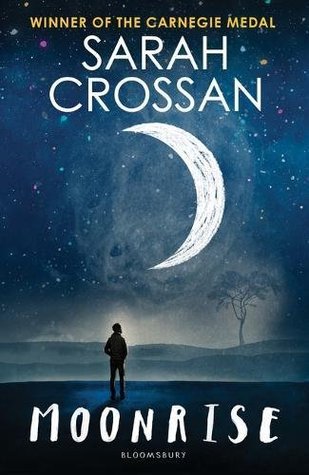Joe Moon is seventeen and hasn’t seen his older brother Ed in ten years in “Moonrise” (Bloomsbury 2018) by Sarah Crossan. Joe is nearly penniless, but he leaves New York to go to Wakeling, Texas. Ed is on death row and his execution date is set.
Crossan. Joe is nearly penniless, but he leaves New York to go to Wakeling, Texas. Ed is on death row and his execution date is set.
Angela, his sister, stays in Staten Island to earn money for the family, slinging burgers. Joe’s father is not in the picture. His junkie mother left and who knows where she is. Aunt Karen helped out as long as Joe and Angela would denounce their brother. In this novel-in-verse, with great economy, Crossan shows the deep emotional story. “But Ed’s crime put us in another league,/ and that’s where Aunt Karen stepped in—/she spat on us and shined us up to look/ like a decent family . . .” And when they couldn’t denounce their brother any longer, Aunt Karen left.
Ed was almost a father-figure to Joe ten years earlier when Ed was 17. But now? Joe hardly knows him. But Ed’s his brother.
Ed says he didn’t do it. The justice system is well known to want a conviction when a police officer is murdered. Teenagers like Ed don’t know not to speak without a lawyer present. Police are known to bully a “confession” out of minors by means of abuse and fear tactics. There’s no DNA at the scene that links Ed. But in the end, does it even matter if Ed is guilty or not? Is the death sentence reasonable? Especially when the justice system might have chosen the wrong perpetrator?
Ed is on the news and made to look vicious. But Ed isn’t vicious. And being related to a convicted murderer? Joe is shunned. He says, “ . . . Newscasters love revealing the beauty of the victims—/like they’re the only ones who got slammed./Reporters don’t give a damn about our family./ We’re not a story. We’re dirt.”
Joe says to Angela “God. It’s better to be guilty and rich,/ I reckon . . .” But Joe gets himself to Wakeling, finds a filthy slum room to live in, tries to line up a job as a mechanic and screws up the nerve to visit Ed on the row. Joe is searched and led down the corridor. “From somewhere close by comes a holler—/a laugh, barbed and desperate.” One feels the culture on the row. Joe speaks to Ed through plexi-glass via a phone. It’s not easy to communicate.
In the meantime, Joe finds Nelly. He needs a friend. He needs support. But, is Nelly a good match for Joe? Will Angela come like she promises? Has anyone seen their mother? These kids need help pretty badly. But maybe they’re the best support there is.
And how do you say goodbye? Time is ticking. The emotion pulls you along and the situation invites discussion on life, death, and love. What’s more important?
Patricia Hruby Powell is author of the young adult documentary novel Loving vs. Virginia and Josephine: The Dazzling Life of Josephine Baker among other books talesforallages.com

Leave a Reply